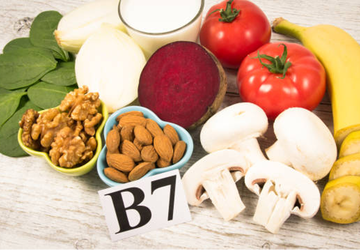health
Veganism: More Than Just a Diet
Embracing a vegan diet is not merely a dietary choice but a holistic approach to life. This comprehensive guide provides essential Vegan Diet Guide knowledge, practical Plant-Based Diet Tips, and addresses the fundamental question, "Is Vegan Healthy?"
Key Components of a Vegan Diet
A vegan diet is exclusively plant-based, avoiding all animal products. Understanding its composition is crucial for health and nutrition.
● Plant Proteins: Sources include quinoa, chickpeas, and almonds.
● Vital Nutrients: Focus on obtaining vitamin D, iodine, and calcium from plant-based sources.
● Balanced Fats: Emphasize omega-3 fatty acids from flaxseeds and walnuts.
Health Aspects of Veganism

While there are numerous health benefits associated with a vegan diet, it's also important to recognize potential nutritional challenges.
Advantages of Choosing Vegan
● Digestive Health: High fiber content from fruits and vegetables supports gut health.
● Reduced Disease Risk: Plant-based diets can lower the risk of diabetes and certain cancers.
● Mental Well-being: Some studies suggest a correlation between vegan diets and improved mental health.
Navigating Dietary Challenges
● Complete Nutrition: It's essential to plan for a well-rounded diet to avoid deficiencies, particularly in vitamin B12 and iron.
● Protein Diversity: Incorporating a variety of protein sources is vital for a balanced diet.
Transitioning to a Vegan Lifestyle
Adopting a vegan diet involves gradual dietary modifications. Here are valuable Plant-Based Diet Tips for a smooth transition.
- Educate Yourself: Understanding the nutritional aspects ensures a healthy diet.
- Meal Planning: Preparing balanced meals is key to nutritional adequacy.
- Embrace Variety: Experiment with different cuisines and flavors.
- Community Support: Join vegan groups for motivation and support.
- Mindful Supplementation: Be aware of the need for supplements like B12 and D3.
Addressing the Question: "Is Vegan Healthy?"
The healthiness of a vegan diet depends on individual planning and lifestyle. It's important to tailor the diet to personal nutritional requirements.
Adapting to Specific Needs
● Active Individuals: May need to focus on calorie-dense foods.
● Children: Ensure a well-balanced diet for proper growth.
● Seniors: Pay attention to protein intake and bone health.
Beyond Health: Environmental and Ethical Considerations
Many adopt a vegan diet for reasons beyond personal health, such as environmental sustainability and animal welfare.
● Sustainability: Vegan diets typically require fewer resources and produce less greenhouse gas emissions.
● Ethical Choices: Avoiding animal products can be a stance against animal cruelty.
Expanding Vegan Horizons: Fresh Perspectives on Plant-Based Living
Delving deeper into the vegan lifestyle, this section offers fresh perspectives and insights, enhancing the Vegan Diet Guide, enriching Plant-Based Diet Tips, and further exploring the intricate question, "Is Vegan Healthy?"
Innovative Nutritional Strategies in Veganism
To maximize the benefits of a vegan diet, adopting innovative nutritional strategies is key.
● Seasonal Eating: Embrace seasonal fruits and vegetables for variety and freshness.
● Nut and Seed Utilization: Leverage the nutritional power of nuts and seeds for added protein and healthy fats.
● Functional Foods: Incorporate functional foods like turmeric and ginger for their health benefits.
The Art of Vegan Culinary Techniques
Innovative cooking methods can transform vegan meals into culinary delights.
Culinary Exploration in a Vegan Kitchen

● Raw Food Cuisine: Experiment with raw vegan dishes for a fresh take on nutrition.
● Homemade Plant Milks: Create almond, oat, or cashew milk at home for freshness and customization.
● Spice Adventures: Use a variety of spices to add depth and richness to vegan dishes.
Culinary Innovation in Vegan Cooking
Embracing innovation in cooking can elevate the vegan dining experience.
Creative Cooking Techniques and Ingredients
● Vegan Cheese Making: Experiment with making vegan cheeses from nuts and nutritional yeast.
● Dehydrated Foods: Explore the use of dehydrators to create snacks like fruit leathers and veggie chips.
● International Vegan Dishes: Expand your palate by trying vegan recipes from different cultures and cuisines.
Embracing Veganism as a Comprehensive Lifestyle
Veganism extends beyond diet into a broader lifestyle choice, encompassing various aspects of daily living.
Conscious Living in Veganism
● Sustainable Living Practices: Adopt lifestyle habits that reduce waste and conserve resources.
● Mindful Consumption: Choose clothing and accessories that align with vegan principles.
Re-evaluating "Is Vegan Healthy?" in a Broader Context
Taking a holistic view of health, we re-evaluate "Is Vegan Healthy?" considering physical, mental, and environmental health.
Comprehensive Health Benefits
● Stress Reduction: Many find that a plant-based diet helps in managing stress levels.
● Emotional Balance: Veganism can contribute to a sense of emotional well-being and alignment with personal values.
● Cognitive Function: Explore the impact of a plant-based diet on cognitive health and brain function.
● Community and Social Connections: Engage with vegan communities for social support and shared experiences.
Veganism Across Diverse Lifestyles and Demographics
Understanding how a vegan diet adapts to various demographics is crucial for its successful integration into different lifestyles.
Adaptation Across Demographics
● Teenagers and Young Adults: Focus on energy-rich and nutrient-dense foods for growth and development.
● Active Lifestyle Enthusiasts: Ensure a balance of macronutrients for sustained energy.
● Retirement Age: Pay attention to easy-to-digest, nutrient-rich foods for maintaining health in later years.
Veganism: A Path to Sustainable and Ethical Living
Adopting a vegan diet is often part of a larger commitment to sustainability and ethical living.
Sustainable and Ethical Practices in Veganism
● Low-Impact Lifestyle: Embrace a low-impact lifestyle by reducing overall consumption and waste.
● Ethical Fashion Choices: Opt for vegan and sustainable clothing and footwear brands.
Veganism in Special Circumstances
Understanding how veganism can be adapted to special circumstances and life changes is essential.
Special Dietary Considerations
● For Athletes: Focus on high-energy and protein-rich foods for performance and recovery.
● During Travel: Tips for maintaining a vegan diet while traveling, including planning and researching vegan-friendly options.
● Life-Transitions: Guidance on transitioning to or maintaining a vegan diet during major life events like moving, starting a new job, or going to college.
Conclusion
Embarking on a vegan journey can be a fulfilling and health-promoting experience. Incorporating these insights from the Vegan Diet Guide and Plant-Based Diet Tips, and understanding the answer to "Is Vegan Healthy?" enables individuals to make informed and sustainable dietary choices. Always consider consulting with nutrition experts for tailored advice on vegan diet.

